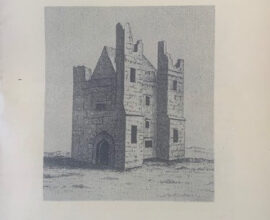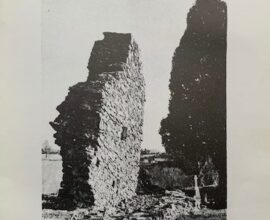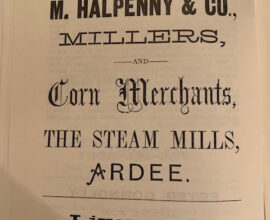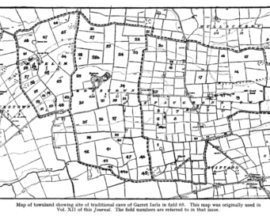General Election in Ardee in 1768
As Election time seems to be just around the corner it is an ideal moment to write about a General Election that took place in Ardee in 1768. Since the Early Medieval period (early 1300’s) Ardee, or Atherdee as it was originally called, had been created a Borough and, among other privileges, its Corporation had the right to elect two members to represent it in the Irish Parliament and did so until the Act of Union of 1800 rendered Parliament in Ireland obsolete.
The Corporation of Atherdee was ruled by two elected Portreeves (the Charter of Queen Anne in the early 1700s reduced it to one), 24 Burgesses and an indeterminate number of Freemen. All of these were Protestant as Catholics were prohibited from holding an office in a Corporate Town. Among other things the Corporation had the right to levy tolls and taxes and to administer the day to day running of the town. Once admitted, Freemen had certain rights and privileges. They elected the Burgesses and from the Burgesses, Portreeves were elected as were the members to represent Ardee in the Irish Parliament.
On 6th July 1768 the Corporation of Ardee exercised that right and re- elected the existing sitting members, John Ruxton and George Lowther, to be Members of Parliament representing Ardee. They were duly sworn and took their seats. However, they were not long elected when the Parliament received a petition challenging both their election and their right to sit in Parliament as representatives for Ardee.

The original documents on the matter are of such interest that I will let them speak for themselves as they will offer a window into the Ardee Corporation meeting room on that day on 6th July 1768. It will also shed light on the workings of the Corporation in the mid-eighteenth century. I have, however, modernised the spelling for convenience and some of the grammar but have retained the original spelling of Atherdee.
The Petition of Thomas Tisdall and Robert Sibthorpe
To the Honourable the Knights, Citizens and Burgesses in Parliament Assembled – the Humble petition of Thomas Tisdall and Robert Sibthorpe esquires showing, that at the late General Election of Burgesses to represent the Borough of Atherdee in the County of Louth in Parliament, your petitioners declared themselves candidates for that purpose.
That Charles Ruxton esquire, who then acted as Portreeve for said Borough, did, by notice in writing bearing the day of June 1768, appoint Wednesday the 6th of July following to hold the said election at the Court House in Atherdee aforesaid.
That your Petitioners did attend on the said day pursuant to said notice as candidates as did also John Ruxton and George Lowther esquires, and the said Charles Ruxton did proceed to take the poll, on the said election. 33 Burgesses and Freemen of the said Corporation, who had a right to vote for members to represent the said Borough in Parliament, did vote for your petitioner Thomas Tisdall, and 27 for your petitioner Robert Sibthorpe, who were received by the said Portreeve, and to whose votes there was no objection made by the said John Ruxton and George Lowther. And several other Freemen who had an undoubted right to vote at said election, having then also tendered their votes for said petitioners, the said Portreeve did reject them, and did also admit several persons to vote for the said John Ruxton and George Lowther who were not legal Burgesses or Freemen of the said Corporation. Notwithstanding they were objected to by your petitioners who were ready to prove their disabilities, but he took upon himself to return the said John Ruxton and George Lowther as Burgesses to represent the said Borough in Parliament though your petitioners were duly elected by a very great majority of the legal and fair Burgesses and Freemen of the said Corporation.
May it therefore please this Honourable House to take your petitioner’s case into consideration
Signed Thomas Tisdall and Robert Sibthorpe
What Tisdall and Sibthorpe were claiming is that, on the day of the election, enough people had voted for them to be elected but that some of them had been disqualified by the Portreeve as not eligible to vote. They further claimed that some of the people who had voted for Ruxton and Lowther should not have been permitted to and, even though they were prepared to show proof, they had not been allowed to by the Portreeve. In any event the Parliament was forced to investigate, and the defence made by John Ruxton and George Lowther sheds much light into how elections were conducted in mid-eighteenth century Ardee. It also differs considerably from the account of the election given by Tisdall and Sibthorpe.
The Case of John Ruxton and George Lowther sitting members for the Borough of Atherdee
Atherdee is a very ancient Corporation for it appears by the recitals in a Charter granted to this Corporation by Queen Anne, that this Borough existed in the first year of King Henry V (anno 1412) and how long it existed before that time is not now known. There are not any Books of this Corporation now extant before 1661. The Ancient Books, if any such existed, were destroyed in the troubles of Ireland.
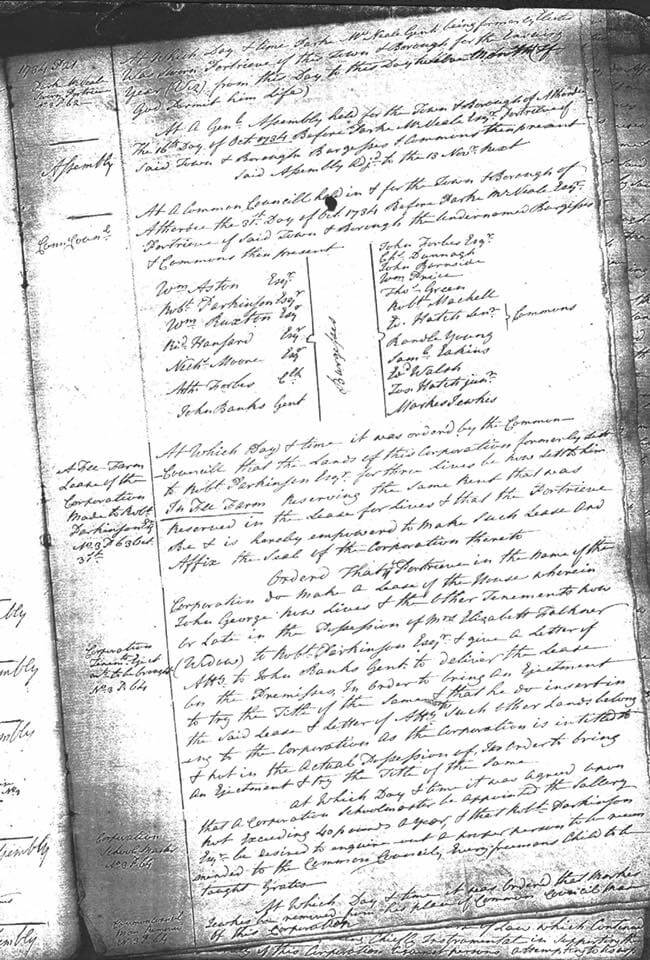
By immemorial usage within this Borough, two Portreeves were elected annually to serve in the said Corporation, but the revenues of said Corporation, by the decay and loss of trade, were reduced to so low a state as not to admit of rendering a suitable support for two Portreeves. The Corporation, therefore, in the year 1711, petitioned Queen Anne for a Charter, enabling them to elect one Portreeve instead of two and employed Richard Tisdall, an Attorney at Law and one of the then Portreeves, to solicit the obtaining of such a Charter which he undertook and solicited at the expense of the Corporation as appeareth in the Corporation Books. And Her Majesty, at the suit of the Corporation, granted them such a new Charter, dated the 28th of February in the 11th year of Her Reign (1713), and therein appointed the said Richard Tisdall (who had been so employed and paid by the Corporation to transact that business), to be Portreeve of said Corporation for the year then ensuing.
It appears from the extant Books that Mr Ruxton and his ancestors have been Portreeves, Burgesses and Free Members of this Corporation for as far back as those Books will admit of the members of the Corporation being traced. For these several years past Mr Ruxton’s ancestors have represented this Borough in Parliament and which the present sitting member has done ever since his father’s death.
On the 6th July 1768 the said Charles Ruxton, who was then Portreeve of the said Corporation, pursuant to a notice by him given, held an election of Burgesses to serve in this present Parliament for the said Borough. The present sitting members were proposed and stood candidates at the said election, as were Thomas Tisdall and Robert Sibthorpe esquires, and a poll was demanded which the Portreeve proceeded to take accordingly.
Before the Poll began it was agreed among the candidates to poll ten on each side alternatively and, upon a toss up to see which side should begin, the present sitting members, having won, it was agreed that they should poll the first ten which was accordingly done. A scrutiny into each man’s right to vote was gone into as they came to the poll. Upon the poll 95 persons tendered their votes for the sitting members out of whom one was rejected by the Portreeve so that, upon the close of the Poll, the number of votes taken for the sitting members was 94
Mr Tisdall and Mr Sibthorpe objected to every voter produced by the sitting members (except 2) and made this as one objection to them all viz, ‘not legally elected, admitted or sworn’ and, to two only, was added that they were not returned to them in the list of Freemen given them by the Register of the Corporation.
But upon these objections been made the page of the Corporation Book, where the admission of each man so objected to was turned to and the admission read and shown as often as required to Mr Tisdall and Mr Sibthorpe or their agent. And, thereupon, the Portreeve took the votes of such persons and no person was admitted to poll for the sitting members whose admission was not read save the two persons to whom no objection was made. No such evidence was offered by Mr Tisdall or Mr Sibthorpe to support such their general objections.
There were tendered by Mr Tisdall to vote for him 45 voters and, for Mr Sibthorpe, 39 out of whom 12 persons were rejected. At the close of the poll the number of those whose votes were taken for Mr Tisdall amounted to 33 and for Mr Sibthorpe to 27. The sitting members, at the close of the poll, had a majority over Mr Tisdall of 51 voices and over Mr Sibthorpe 57, whereupon the Portreeve declared the sitting members to be duly elected and made his return accordingly.
Seven of the persons rejected were so rejected because no person of their name appeared in the Books to have been admitted Freemen. One was objected to as having been disfranchised and which appeared in the Books to have been done in 1719. Four were objected to as not being the persons admitted Freemen and two of them confessed they never enjoyed the privileges of Freemen. The third said he was not sworn until after the year 1719 and it appeared in the Books that the real Freeman was sworn in 1709. The fourth said he was but 50 years old and it appeared on the Books that the Freeman was admitted in the year 1713 whereupon they were rejected.
There was another person who voted for Mr Tisdall and Mr Sibthorpe who was objected to by the sitting members for being married to a Papist and educating his children in the Popish Religion, but the Portreeve received his vote and every other person who tendered his vote for Mr Tisdall or Mr Sibthorpe were admitted to poll.
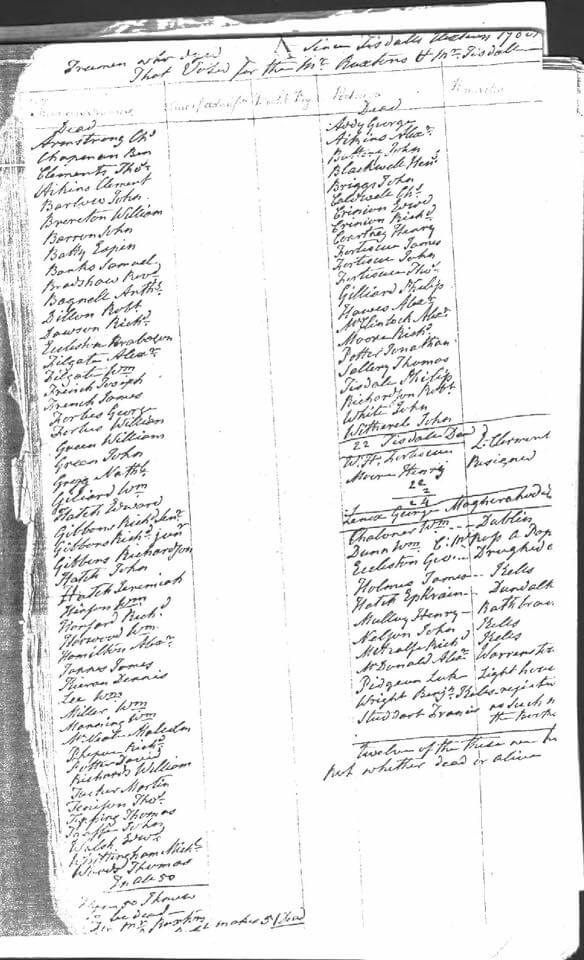
It appears from hence what the objections were, upon which the persons were rejected who would have voted for Mr Tisdall and Mr Sibthorpe, and that the Portreeve did not receive the vote of any person for the sitting members who were objected to until his admission as a Freeman was read out of the Corporation Books. But even if it were to be supposed that the persons so rejected had a right to vote, and that their poll had been taken, the majority in favour of the sitting members would still be considerable viz over Mr Tisdall 49 and over Mr Sibthorpe 55.
As to the general objection made with regard to the voters not being legally elected, it appears from the Books that; 5 of the Freemen who voted for the sitting members had been Free fifty years; 19 have been Free forty years; 15 have been Free thirty years; 21 have been Free twenty years; 29 have been Free ten years and 5 have been Free six years. All of whom have ever since joined in Corporate Acts and voted for members to serve in Parliament and no person has been admitted Free since the year 1763. It also appears in the Corporation Books that the Freemen so objected to were admitted in the very same manner and many at the very same time with those who voted for Mr Tisdall and Mr Sibthorpe.
Notwithstanding the undisputable majority in favour of the sitting members, and the several circumstances herein before mentioned which, it is apprehended, most fully demonstrates the candid and impartial manner in which this election was carried out , yet Mr Tisdall and Mr Sibthorpe thought it proper to prefer a Petition to the House of Commons complaining of an undue return being made of the Burgesses to represent the said Borough of Atherdee in the present Parliament.
Signed John Ruxton and George Lowther
This petition was brought before the House of Commons on 2nd of December 1769 but it was adjourned after a short debate. It was heard again on the 6th and 7th of December and, after lengthy debate, Tisdall and Sibthorpe withdrew their petition so Ruxton and Lowther retained their seats.
It can be seen from the above that even in the mid-eighteenth-century dubious methods were been utilised in attempts to influence an election where, among other things, accusations of impersonation were rife. One voter was actually caught out as he claimed to be aged fifty when casting his vote in the 1768 election. The Corporation Books showed that the person he claimed to be was actually admitted a Freemen in 1713. Therefore, he would have been 5 years old at the time of his admission to the Corporation of Atherdee. The Ruxton side, for their part, maintained to have conducted the election correctly. They claimed that all those who voted for them and who were objected to by Tisdall that they had produced the Minute Book of the Corporation to show proof of the admittance of Freemen.
One of the positives that emerged from this particular incident, at least from the point of view of the historian of Ardee, is that the challenge to the election caused both sides to generate evidence to support their claims of allegation or defence of a rigged election. This left us with some important historical records not least of which are known as the Ruxton Transcripts where the Ruxton family had a scribe copy from the original minute books of the Corporation and which are important now as some of the original minute books, especially volumes one and two, are so badly damaged as to make them difficult to decipher.
Finally, there is a massive twist to the tale. I located what appears to have been a contemporary list of all the Freemen who were admitted to the Corporation of Atherdee between 1690 and 1763. It is laid out in the form of an index which lists the Freemans name, date of admission, the volume and page number in the Corporation Minute Book when they were sworn and the name of the Portreeve at the time. This may have been the document used, as mentioned in the above, where they were able to go to the actual page of the Corporation Books to prove admittance as Freemen and, therefore, entitled to vote. At some stage after the Parliament ruled for the sitting members it seems that somebody went to the trouble of cross checking all the names of the Freemen who were supposed to have polled in the election that day. They arrived at some shocking conclusion as they found that of the Freemen who voted for John Ruxton, in the 1768 election, that 52 of them were actually deceased before that date and of the ones who voted for Tisdall that 23 of them were deceased. So Ardee now has another claim to fame where dead people were casting their votes in the election of 1768.
The Ardee Corporation Minute Books along with the Ruxton Transcripts are now in the County Archives in Dundalk. However, I made copies of them over 20 years ago and have recently digitalised them all with a view to making them available online in the near future.

